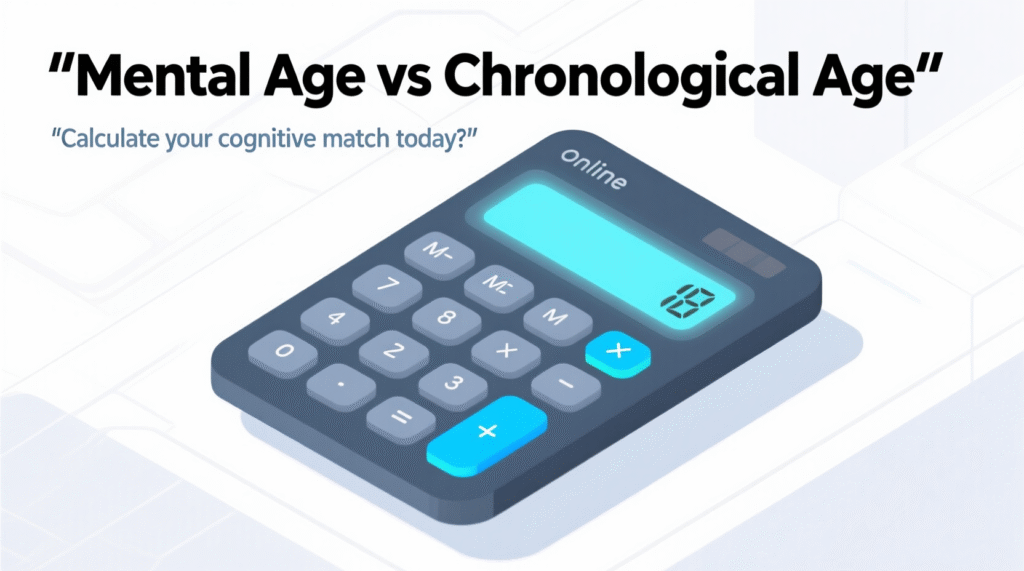
When people talk about mental age versus chronological age, they’re asking a simple but powerful question: Do you think and act your actual age, or does your mindset reflect a younger or older perspective?
Let’s break it down in plain language so you can understand how both concepts shape learning, relationships, and self-awareness.
- Chronological age is the number of years you’ve been alive.
- Mental age reflects how mature, emotionally balanced, and cognitively developed you are compared to others.
Example: If you’re 25 years old (chronological age) but think and solve problems like a 35-year-old, your mental age is higher than your actual years.
What Is Chronological Age?
Chronological age is the easiest to define—it’s simply your birthday count. Doctors, schools, and governments use it to decide when you can drive, vote, or qualify for certain health screenings.
- It always moves forward.
- It’s fixed and cannot change.
- It’s the basis for legal and social milestones.
Take our mental age test accurate to see how your mental score compares to your real, chronological age.
What Is Mental Age?
Mental age is more about your mindset, maturity, and emotional growth. It looks at:
- How you solve problems.
- How you regulate emotions.
- How responsible or spontaneous you are.
A teenager who handles stress like an adult may have a mental age above their chronological age. Likewise, an adult who avoids responsibility might have a mental age lower than their actual age.
Key Differences Between Mental Age and Chronological Age
| Aspect | Chronological Age | Mental Age |
|---|---|---|
| Definition | Years since birth | Cognitive and emotional maturity level |
| Measurement | Date of birth | Behavior, tests, decision-making patterns |
| Flexibility | Fixed, always increases | Can be higher or lower than actual years |
| Use Cases | Legal, education, healthcare | Personal growth, relationships, psychology |
Explore mental age vs real age for practical examples of how these two measurements differ.
Why the Difference Matters
Learning and Education
Teachers often notice that some kids perform above or below grade level. That’s the gap between chronological age and mental age, and it helps identify learning needs.
Relationships and Communication
In friendships or romantic relationships, a mismatch in mental age can cause misunderstandings. For example, two people the same age might feel like they’re “in different stages of life” because of their maturity levels.
Self-Understanding
Knowing your mental age can help you recognize strengths and areas for growth. It’s not about labeling yourself but about building self-awareness.
Mental Age, Chronological Age, and IQ
Historically, IQ tests were based on comparing mental age to chronological age. For example, if a 10-year-old solved problems like an average 12-year-old, their IQ was calculated as above average.
Today, IQ tests have evolved, but the concept still highlights the link between how old you are and how old your mind seems to be.
Find out what factors influence your test outcome in what affects your mental age
Real-Life Examples
- Younger Mental Age: A 40-year-old who loves playful activities, avoids responsibility, and enjoys living carefree might have a mental age closer to 25.
- Older Mental Age: A 16-year-old who manages money responsibly, studies independently, and supports others emotionally might show a mental age closer to 25.
See how your results compare to your real years in mental age vs real age.
FAQs
Can mental age be higher than chronological age?
Yes. This happens when someone is more mature or advanced than their peers.
Can your mental age change?
Absolutely. Experiences, challenges, and personal growth can raise or lower it.
Which is more important—mental or chronological age?
Both matter. Chronological age defines your legal status, while mental age shapes how you think, act, and connect with others.
- A deeper breakdown is available in mental age vs real age.
- You can compare life stages further in mental age vs chronological age.
- The role of emotional development is covered in mental age vs emotional age.
- Differences in thinking style are explained in mental age vs cognitive age.
- Why maturity matters is discussed in why is mental age important.
- How behavior changes across ages appears in how do you act according to your mental age.